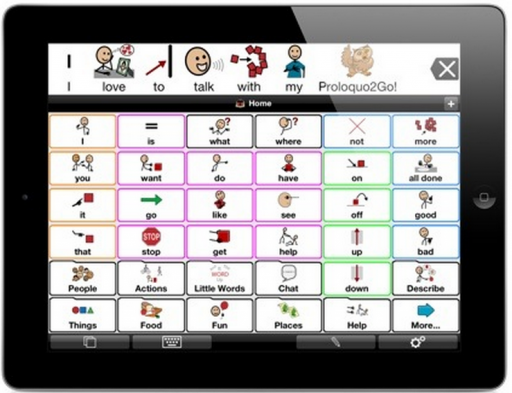iPad helps 5-year-old find his voice
July 2, 2012

Proloquo2Go
Five-year-old Hunter Harrison, born with a neuromuscular disability, uses an iPad to learn to speak, using Proloquo2Go, a speech-therapy app, combined with games and exercises.
The user generates natural speech by tapping buttons with symbols or typing using the on-screen keyboard with word prediction.
The treatment was developed by Jane Kleinert, associate professor in the Division of Communication Sciences and Disorders in the University of Kentucky College of Health Sciences, and a colleague, Jacqui Kearns of UK’s Human Development Institute (HDI).
The two are now working on a low-incidence initiative to develop communication systems for children with the most significant disabilities, supported with a grant from the Kentucky Department of Education, administered through HDI.
“We’ve noticed that his speech is obviously becoming a hundred times better,” said his mother, Melissa Harrison. “Before we started, we could barely get just the normal first words that most kids say like ‘mom’ and ‘dad’ and things like that. Now you can give him a book, and he can sit down and read it clear enough for you to understand what he’s trying to say. So he’s reading, and he’s reading to people, which before would have never happened.”
Kleinert says that many other children with communication disabilities, including those with autism and cerebral palsy, could benefit from a device like the one Hunter uses. But the biggest funders for augmentative and alternative communication (AAC), such as Medicaid and Medicare, restrict funding to “dedicated instruments” specifically designed for communication.
“That means that, under current guidelines, a multitasker like the iPad does not qualify. That’s unfortunate, as dedicated AAC instruments tend to be larger, often weighing several pounds, and much more expensive, frequently costing several thousands of dollars,” she said.
A bulky, dedicated AAC instrument also conspicuously marks its user as having a disability, while an iPad is seen as perfectly ordinary, or even as a badge of status.